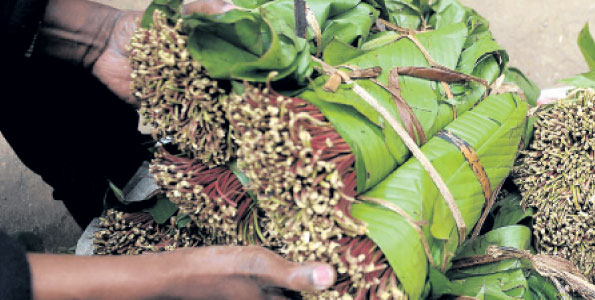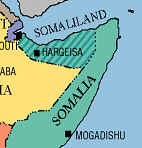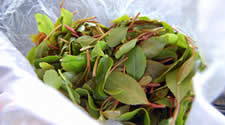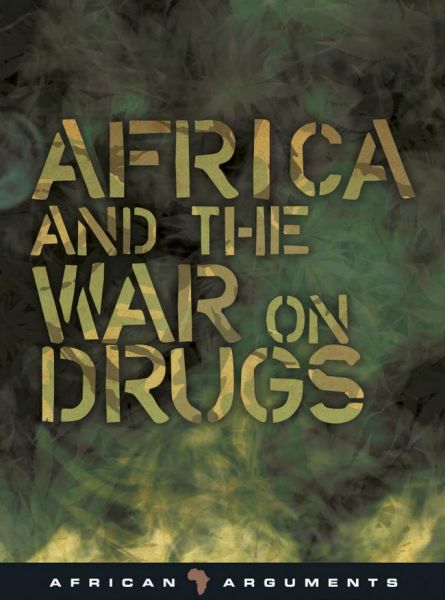 Here's some news that should surprise nobody. International efforts to suppress the trade in a psychoactive plant are failing to do so, but are jacking up the social costs of its use—which might be quite negligible if the stuff weren't illegal. In this case we're talking about khat, the mildly stimulating leaf that is chewed socially in the Horn of Africa and its immigrant diaspora. It was sold openly at groceries and eateries in London's African communities until Britain finally banned the stuff in of 2014, following the example of the United States (of course). At that time, it became a Class C substance under the UK Misuse of Drugs Act. By way of comparison, cannabis is in the more restrictive Class B—although between 2004 and 2008 pot was placed in Class C, and there is an initiative to have it removed from the classification system altogether.
Here's some news that should surprise nobody. International efforts to suppress the trade in a psychoactive plant are failing to do so, but are jacking up the social costs of its use—which might be quite negligible if the stuff weren't illegal. In this case we're talking about khat, the mildly stimulating leaf that is chewed socially in the Horn of Africa and its immigrant diaspora. It was sold openly at groceries and eateries in London's African communities until Britain finally banned the stuff in of 2014, following the example of the United States (of course). At that time, it became a Class C substance under the UK Misuse of Drugs Act. By way of comparison, cannabis is in the more restrictive Class B—although between 2004 and 2008 pot was placed in Class C, and there is an initiative to have it removed from the classification system altogether.

 Here's a telling irony. We think of Somalia as a country that has basically had no functioning government for over a generation, and is beset by insurgents linked to al-Qaeda. Certainly, how a government treats a relatively harmless psychoactive herb is a good barometer of its general commitment to freedom. The herb in question here is khat, the mildly stimulating leaf that is chewed socially throughout the Horn of Africa. And
Here's a telling irony. We think of Somalia as a country that has basically had no functioning government for over a generation, and is beset by insurgents linked to al-Qaeda. Certainly, how a government treats a relatively harmless psychoactive herb is a good barometer of its general commitment to freedom. The herb in question here is khat, the mildly stimulating leaf that is chewed socially throughout the Horn of Africa. And  Muslim community leaders in Texas are protesting the latest outbreak of the perennial hype over the khat plant and its supposed links to terrorism. It began when a traffic stop near Houston last year turned up two men chewing the midly psychoactive but thoroughly illegal leaf. This sparked a year-long investigation involving local, state and federal agencies that has so far resulted in more than a half-dozen arrests. The
Muslim community leaders in Texas are protesting the latest outbreak of the perennial hype over the khat plant and its supposed links to terrorism. It began when a traffic stop near Houston last year turned up two men chewing the midly psychoactive but thoroughly illegal leaf. This sparked a year-long investigation involving local, state and federal agencies that has so far resulted in more than a half-dozen arrests. The  For those who have been wondering what the truth is behind the media sensationalism about global cartels establishing Africa as their new theater of operations, Africa and the War on Drugs by Neil Carrier and Gernot Klantschnig (Zed Books, London, 2012) clears the air in a welcome way.
For those who have been wondering what the truth is behind the media sensationalism about global cartels establishing Africa as their new theater of operations, Africa and the War on Drugs by Neil Carrier and Gernot Klantschnig (Zed Books, London, 2012) clears the air in a welcome way.





Recent comments
2 weeks 2 days ago
2 weeks 2 days ago
5 weeks 3 days ago
6 weeks 2 days ago
10 weeks 2 days ago
14 weeks 1 day ago
18 weeks 1 day ago
18 weeks 6 days ago
28 weeks 6 days ago
33 weeks 2 hours ago